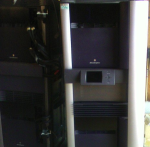Hmm - "open architecture" as applied to software: UNIX was the original "open system" - all parts were documented, and the sources were available to anyone who wanted them from AT&T (provided you could pay) and Berkeley (originally required license from AT&T to get BSD, but later not).
"Open architecture" as applied to hardware: SPARC. Anyone can build a SPARC processor, and SPARC international will provide stuff to help you do it. Sun even has an open core that you can grab and build onto (with some restrictions). Open Firmware is a standard, and there's even a FOSS implementation in development now. Same with SBUS...
Compare this with x86 and Itanium, which are available from a few vendors but aren't "open standards". BIOS is provided by only a few companies, and not completely documented. EFI is a bit better, but things still are generally proprietary.
Sounds to me that the new SGI must be moving to SPARC-based hardware running Solaris/xBSD/Linux if they're really "... moving from antiquated RISC/proprietary Unix to an open architecture"
Although I suppose that MIPS is open enough to count.
Too bad, though - I would have hoped that someone would have picked up Alpha again, but that is pretty proprietary. Even more proprietary than Itanium and Intel x86...

.










 (single-CM)
(single-CM)


 )
)

 <>
<>

 .
.
